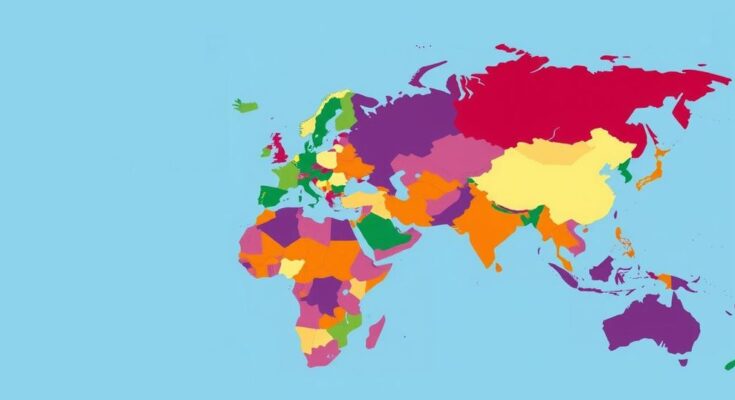The Trump administration is considering a travel ban affecting citizens of 43 countries, proposing a “red” list barring entry from 11 nations, and an “orange” list of 10 nations with restricted access. This initiative, developed by the State Department, follows Trump’s executive order to enhance vetting procedures. Legal and diplomatic implications remain significant as the proposal progresses.
The Trump administration is contemplating a new travel ban affecting citizens from up to 43 countries, which would extend beyond previous restrictions imposed during his first term. According to officials, the proposed draft suggests a “red” list comprising 11 nations whose residents would be prohibited from entering the United States, specifically Afghanistan, Bhutan, Cuba, Iran, Libya, North Korea, Somalia, Sudan, Syria, Venezuela, and Yemen.
In addition to the red list, an “orange” list of 10 countries has been outlined where travel restrictions would apply, allowing affluent business travelers entry, while limiting visitors on immigrant or tourist visas. The nations on this list include Belarus, Eritrea, Haiti, Laos, Myanmar, Pakistan, Russia, Sierra Leone, South Sudan, and Turkmenistan.
On January 20, Trump directed the State Department to identify countries with inadequate vetting processes, necessitating a report by the end of the month. Various departments, including Justice, Homeland Security, and the Office of the Director of National Intelligence, are involved in the review. Notably, the State Department emphasized its commitment to safeguarding national security in the processing of visas.
Notably, Afghanistan, which fell to the Taliban after the U.S. withdrawal in 2021, is among the countries likely targeted for restrictions, although the status of existing visa holders remains unclear. Additionally, the administration faced criticism for a recent decision to revoke the green card of Mahmoud Khalil, a former student who advocated against Israeli actions in Gaza.
While some nations on the lists align with Trump’s prior travel bans, new additions raise questions. For instance, Bhutan’s inclusion, a small predominantly Buddhist country, and restrictions on Russia suggest shifting diplomatic priorities. The proposal further includes a “yellow” list of 22 countries given 60 days to address perceived deficiencies or face stricter measures, highlighting concerns regarding traveler information sharing and security practices.
During his first term, Trump faced judicial challenges that affected his travel ban policies. However, the Supreme Court eventually permitted a revised ban affecting eight nations. In contrast, President Joe Biden revoked these bans in January 2021, labeling them as inconsistent with American values of inclusivity. Trump’s recent executive order indicates a revival of such restrictions to protect American citizens from potential threats.
The proposed travel ban under the Trump administration aims to expand restrictions on individuals from 43 countries, including a new categorization of nations into red, orange, and yellow lists. These measures echo previous efforts to strengthen national security and address perceived inadequacies in vetting processes. Moreover, the inclusion of certain countries raises questions regarding U.S. foreign policy and the implications for diplomatic relations. The outcome of this initiative remains uncertain as it progresses through governmental review processes.
Original Source: risingnepaldaily.com




